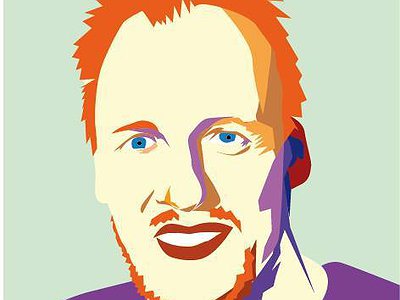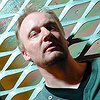Could you describe your creative process on the basis of a piece or album that's particularly dear to you, please? Where do ideas come from, what do you start with and how do you go about shaping these ideas?
An exceptional album would be The Precious Herd after a comic strip by Matt Howarth. In this story a novice wrangler escorts the Precious Herd as it crosses Bone Desert. He has to guard it from hazardous threats, and lead the herd back to the safety of the city.
The artist wanted me to describe the landscape that the herd passes using certain desert sounds, which I rejected, I wanted to convey a feeling, a comment, because the comic strip is there anyways. I was thinking about polyrhythmic sequences to give an impression of a somehow supernatural sound. Concentrating on certain aspects of each chapter, I very intuitively chose those moods/ambiances: so one piece has strong dissonances. My friend and colleague Tobias Reber immediately understood the analogy to that chapter’s title which is Deviating from the Path. For me this proves that in order to achieve complex and appealing results I can rely on my intuition.
With more and more musicians creating than ever before and more and more of these creations being released, what does this mean for you as an artist in terms of originality? What are some of the areas where you currently see the greatest potential for originality and who are some of the artists and communities that you find inspiring in this regard.
In terms of originality, I think that first of all music should be emotional and touching. In fact it should just have the potential to be somebody’s favourite song. And that is the area where I still see a great potential for “originality”. I’d even say that in a time when almost everybody seems to be trying to look and sound like certain role models, there is an even greater need and and possibility to be novel and original than ever before. But of course due to the masses of releases it is somehow hard to find out what is important and what isn’t. In a way the channels just get clogged. I guess it is not only necessary to be inventive in terms of music, but also in the way the own output has to be promoted.
When recently traveling to Turkey to my surprise I found a lively electronic improvising scene which I found really inspiring. I met Cagri Erdem and Sevket Akinci from the project Earafter?. Together we played a concert, you can listen to the results on the pages of iapetus media.
How strictly do you separate improvising and composing?
I don’t really make a difference. I think a composition can be developed by intuitively interacting in a process even if composition traditionally is regarded as longtime work of a single artist who achieves a piece step by step. My preferred way is to improvise and interact, I believe that the expression gets more personal and intensive this way.
I do not consider improvising as just randomly and aimlessly wandering around but I always create a technical or conceptual basis before allowing myself to work in a purely intuitive way.
I could not say that the process of improvisation determines the conceptual work/composition or if it is the other way around.
How do you see the relationship between sound, space and composition and what are some of your strategies and approaches of working with them?
My joy of music is defined by my enjoying sound and soundscapes. I recently composed (and this time I really had to traditionally compose) a piece for 12 loudspeakers that were arranged in an outdoor space at Aufbau Haus Berlin. I had to quite abstractly imagine the space. I defined three parts. First I created a rhythmical part with constantly changing metrics, I improvised a melodic part, and finally created space effects; for instance extreme reverb and delay. These three parts I let play by one speaker after the other, so the music kind of wandered through the space with the reverb coming from a different corner than the sound it was reverberating. This way I managed to transfer my spatial sensation/feeling of sound to a real space.
What's your perspective on the relationship between music and other forms of art – painting, video art and cinema, for example – and for you and your work, how does music relate to other senses than hearing alone?
I do not really make a difference, there is a strong feeling of synaesthesia that I have: listening to music creates a sensation of space and movement in my mind. I would like to be able to evoke this feeling in the listener. Sometimes I feel that I can bathe in music and I try to convey this intensity.
Besides my work as a composer and musician I also paint and draw. Although I don’t paint deliberately in a way that the analogy between my music I do and my paintings becomes salient people consider them as a visual counterpart to my music.
What's your view on the role and function of music as well as the (e.g. political/social/creative) tasks of artists today – and how do you try to meet these goals in your work?
I believe artists to be in a meta position, I prefer to not comment on political/social topics but to rely on my art to transport a certain quality of a holistic discernment, so to say.
In my opinion artists can chose how and on which level they want to influence society. There is much more that can be done than sing revolutionary songs, I daresay ...
Listening is also an active, rather than just a passive process. How do you see the role of the listener in the musical communication process?
I’d like to give the music as well as the listener the opportunity to transcend the work as such.
My music is a craft, and I hope that the listeners, too, bring their craft of listening into the equation; to shape the work through the act of listening.
Reaching audiences usually involves reaching out to the press and possibly working with a PR company. What's your perspective on the promo system? In which way do music journalism and PR companies change the way music is perceived by the public?
The usual way that music is talked about and the way PR functions forces musicians to constantly publish new material, because everything that you want to be talked about has to be new for some inexplicable reason. Downloads aren’t really accepted, yet only CDs really count. In the end the artists cannot really take care of selling the material that already exists, instead there is an imperative to produce new things, though it is hard to get any attention for new releases anyway.
In music journalism there is a certain way of speaking about music that somehow infects the musicians' way of talking about their own music. If I publish new music I somehow feel forced to write a blurb in anticipating the way a music journalist assumedly would write in order to make it more likely that my music be received enthusiastically by the press. This all seems to cause a kind of a weird feedback effect. I am not sure how counter-productive this is for the very much desired interconnection with the audience.
Do you have a musical vision that you haven't been able to realise for technical or financial reasons – or an idea of what music itself could be beyond its current form?
Technically I am dreaming of a system I would call “Instant Prog Rock”; it interprets all my actions on the keyboard, dynamics, chords, so that there is a reasonable context from which it generates a suitable and complex accompaniment. I want to get rid of the compulsive gamut. I want to be able to smoothly pass from one scale to another with all the accompanying tracks I already generated within my last performance. I am dreaming of highly complex music derived from intuitive improvisation, but with an inner structure not a random one.
But I also strive to perform live in more and different places.
I would like to be appreciated for the quality and professionality of what I am doing and I would also like to be compensated financially to be able to live from this work.
Find out more about the work of Bernhard Wöstheinrich on his Facebook page. His music is available from iapetus media.



